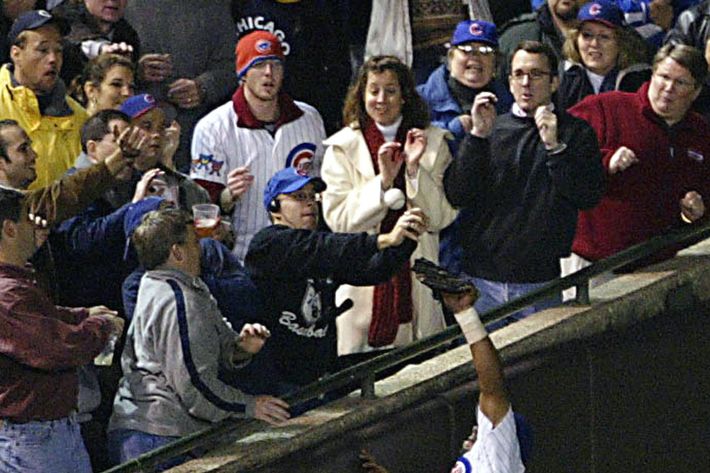

We live in a sports culture where everyone, at all times, is selling something, mostly themselves; whereas we once kept score by money, we now keep score by fame. Chad Ochocinco tries out for a soccer team solely for his reality show; Curt Schilling is so obsessed with being the Perfect Baseball Family Man that he allows this photo to be released into the wild. Carmelo Anthony didn’t come to New York because he thought it would give him the best shot at a championship; he came because he thought it’d be where he could make the most endorsement money. (And he’s right.) It might just be that of all the sports personalities of the last twenty years, the most heroically pure is arguably Steve Bartman, the poor bastard whose reach for a foul ball in the 2003 National League Championship Series might have cost his beloved Chicago Cubs a trip to the World Series.
Bartman is the hermitlike subject of Alex Gibney’s new documentary, Catching Hell, which premiered at the Tribeca Film Festival on Saturday night, and he doesn’t speak in the film; he is, as always, an unwilling subject. Since Bartman’s eventful night, he has only released one two-paragraph press release and then vanished from sight. He has never given an interview, never appeared on a reality show, never accepted any of the hundreds of thousands of dollars offered him to come out of hiding. When most people have some sort of public scandal, they find a way to profit from it, whether it’s Kim Kardashian making a career out of a leaked sex tape or Eliot Spitzer getting a talk show (and a documentary by Gibney) in the wake of his time in gossip pages. All Bartman wanted was to be left alone. Most people say this, but when their time comes, they don’t mind all the cameras. But Bartman: Poof, he was gone. Today, that’s heroic.
Gibney’s film, part of ESPN’s “30 for 30” series, certainly illustrates why he needed to disappear in the first place. I’ve written and reported on the Bartman incident myself, but Gibney uncovers all kinds of great new details. He finds the empathetic, sad security guard who escorted Bartman out of the stadium and hid him at her house for several hours after the game; there Bartman flipped past ESPN and WGN and finally understood what he had wrought. Gibney unearths the famous Thug Fan who rushed down to fight Bartman, pouring beer on him and instigating his evacuation in the first place. He makes the most convincing case I’ve seen yet, using isolation video and simple physics, that Moises Alou indeed would have caught the ball, had Bartman (and several others, of course) not gotten in his way. And he notes, for the first time that I’ve seen, that Bartman was not at the game by himself; his good friend and the friend’s girlfriend were sitting right next to him. Though, watching the game, you couldn’t tell it; they looked as worried sitting next to him as any stranger would.
Gibney’s journalistic diligence on the Bartman play is the strongest aspect of the film, but most of the rest of it doesn’t work. Gibney has an infamous propensity to have five projects going on at once — since his 2005 documentary Enron: The Smartest Guys in the Room, he has directed five different films, from the great Taxi to the Dark Side to the less-great Client 9: The Rise and Fall of Eliot Spitzer — and you get the sense that Catching Hell was more of a hobby than a passion. He narrates the film himself and often cuts to an interview he did with WGN Radio, a directorial indulgence that gives the film a dashed-off quality. And his Red Sox fandom leads him to equate Bartman’s plight with Bill Buckner’s, after the first baseman infamously let a ball roll between his legs in the 1986 World Series. The comparison isn’t apt, yet Gibney rehashes the Buckner play in monotonous detail, adding little to that story, let alone Bartman’s. Quite frankly, I’m not even sure Gibney really understands the details of sports all that well: Everything in Gibney’s universe is an epic battle of curses and folklore and the sort of Ken Burns hoo-ha that turn sports into something bigger, and faker, than simply a bunch of guys running around in a circle and throwing orbs at each other. Gibney is a faux-myth-maker in the Burns/Bob Costas mode, and sports is far, far more interesting than that.
But when the focus is on Bartman and the details of that night in Chicago, the film soars. Gibney clearly cares about Bartman and sees him as the ultimate scapegoat, the modern-day man who suffered for all our sins and excesses. Gibney also gives Bartman the ultimate documentarian’s credit: He doesn’t once imply that there was anything wrong with Bartman not wanting to give his side of the story on-camera. Gibney understands that Bartman’s reclusiveness is the one part of his life, and his name, that he still owns. The least we can give him is that.


